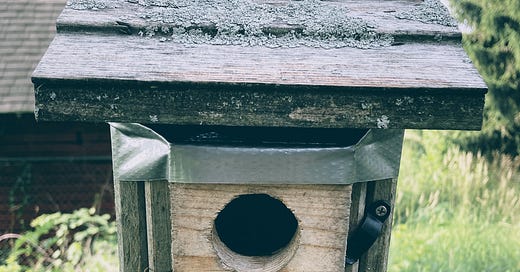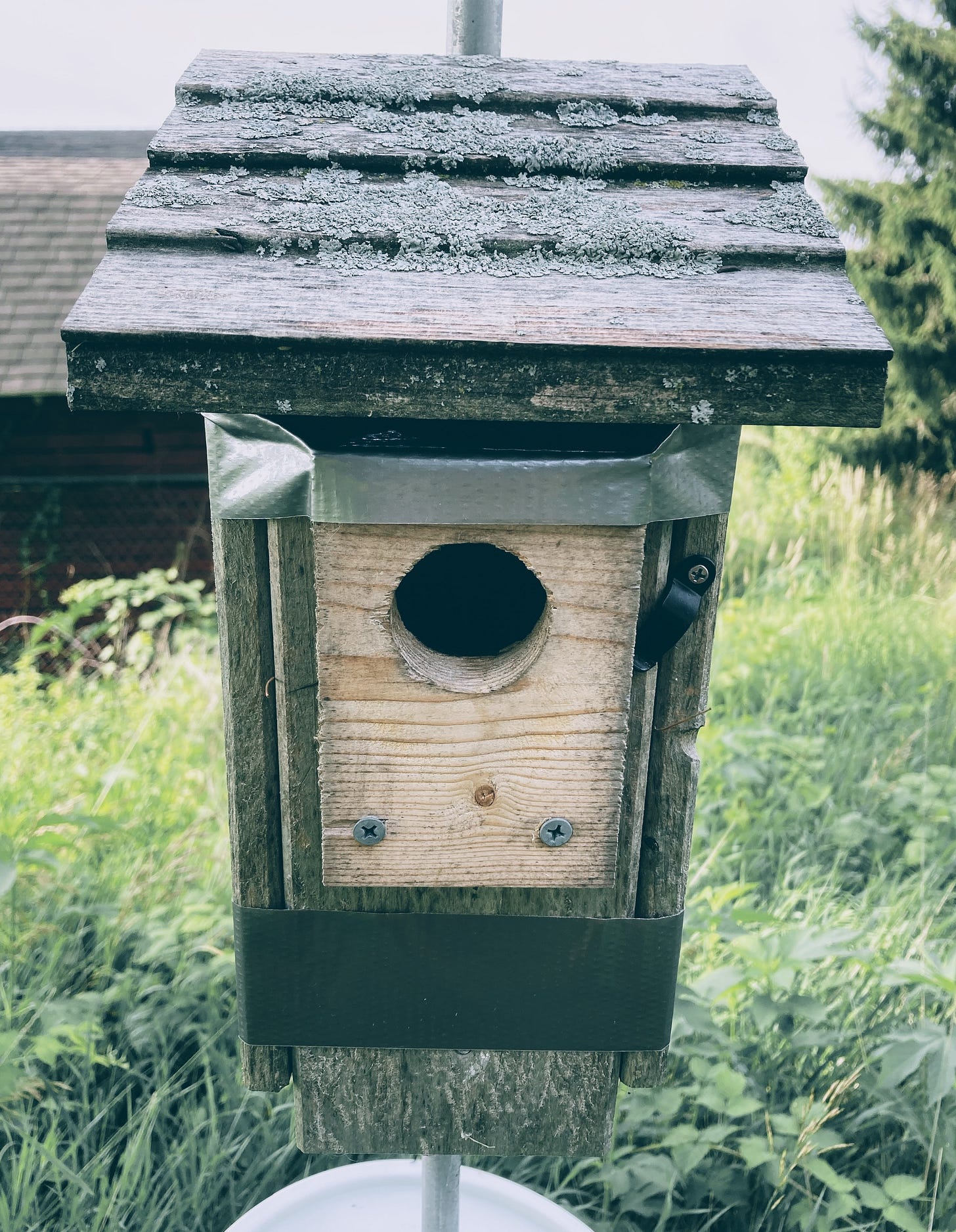Two years ago, I told my family that all I wanted for my birthday was for them to do whatever I asked for half a day. They said yes, probably figuring we’d go out to dinner and a movie. Instead I had them help me dig fifty feet of trench to plant asparagus. Then we built seven birdhouses.
Those birdhouses now line our property. Contrary to what I heard growing up, if you peek inside a bird house, the parents don’t abandon the babies. In fact birding websites say to check nests regularly for invasive sparrows, dead birds, ants, parasites, and of course the joy of watching babies. So when I got these bird houses, I knew this wasn’t just a gift for the birds, this was a gift for me. I was going to become a nest watcher.
It's worth mentioning that I am an absolute sucker for a good metaphor. My editor once called me the Metaphor Queen. A reader of my book draft counted five metaphors in one paragraphs. (Indulging her, I removed two). Theologian Walter Brueggemann says biblical authors used lots of metaphors to keep people from pompously thinking they could nail down God, so I’m in good company. Professional storyteller Matthew Dicks says if you really want to change lives, expand your metaphor into a story. And neuroscience research has found that metaphors are “the fundamental way that brains understand abstract concepts like love, joy, society, and economy,” and humans average one metaphor every ten seconds in speech.
I’m the kind of person who tears up over a good metaphor. Like I’ll be singing along cheerily in the car with my kids to this song about the “egg in the nest in the tree in the bog” and suddenly my voice catches because “in that egg, there was some hope, a rare hope, a rattlin’ hope.” Jeepers, it’s speaking to just about everything that matters right there.
So sometimes the state of these mama bluebirds, wrens, and swallows—whose populations are, by the way, dropping at alarming rates—feels like the state of the world. And when I look inside those nesting boxes, I’m not just looking for eggs, I’m looking for hope.
But it does, of course, also matter what happens to the actual, non-metaphorical birds. So let me tell you.
First a robin built a nest on our porch ledge, and we were thrilled to watch her daily progress. She laid three pretty eggs. One never hatched. One I found chick I found dead from a stab wound to its heart, maybe from the bluejay yapping in the yard. The last one disappeared a few days later.
A bluebird couple has been coming to my oldest nest for years, and I watched them begin nesting. Then an invasive house sparrow took over. I pitched out the sparrow’s nest. The bluebirds began again.
Meanwhile sparrows invaded three other nests, and in one I found a swallow, killed defending her eggs. A tree limb crashed onto another nesting box, knocking it flat to the ground. When I tipped it up, a trapped wren flew out. Three eggs also tumbled out. One shattered.
Meanwhile the bluebird couple returned to rebuild their nest. By now it was late in the season, but to my delight, two eggs hatched. Two nigths later, raccoons ripped the whole box open and devoured the babies.
Oh, and the raccoons also ate two of my chickens.
I watched a bluebird parent perch on my garden trellis and wondered how birds grieve.
But here is the reason I invited you to read this far, and why I also rolled this story into a poem.
It was late June by now, past the usual nesting season, so I stopped checking the boxes. But for whatever reason, one morning I peeked in the bluebird house. And gol dangit if there wasn’t the unmistakable, tidy, round form of a bluebird nest. In the middle, one smooth blue egg.
The mosquitoes are horrific now. I put on a full-body net suit and went out like a beekeeper to install a predator-stopping baffle and wrapped the house in duct tape. We’re not taking any chances.
I know in the grand scheme of things happening these days, there’s plenty more to worry about than couple of bluebirds. But I want you to have another metaphor in your pocket: we have to keep rebuilding the nests. Be the bluebird. When the safe nurturing places get ripped open by defunding or defamation or discrimination, we have to endure longer.
We have to build again. Again. Again.
Bonus: Read this story as a poem.




